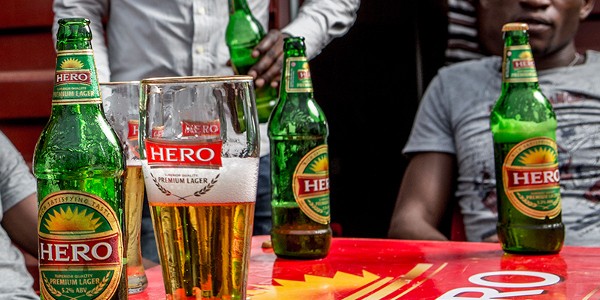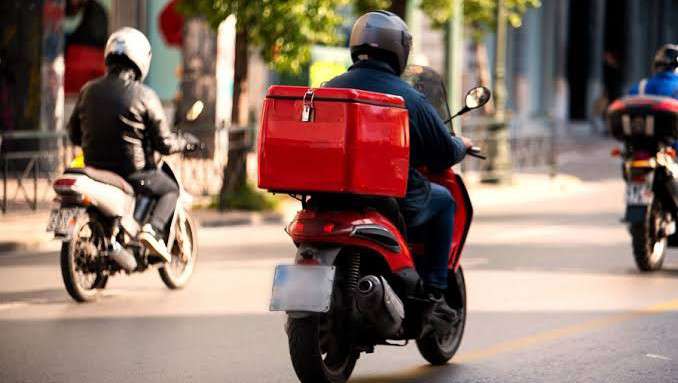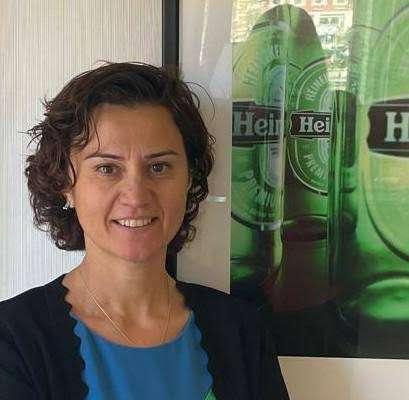Brands
Beer War: AbInBev displaces Guinness as industry leader

...targets Nigerian Breweries
For long periods, Nigerian Breweries Plc. (NB) was the undisputed king in the country’s beer industry, with its value brands, Star and Gulder bossing the market. The only challenger was Diageo through its subsidiary, Guinness Nigeria, which by the way seemed quite comfortable in its second position.
However, the landscape changed with the entrance, originally of SABMiller, but now the world’s largest brewer, Anheuser-Busch InBev (AbInBev). The new entrant has displaced Guinness in second place and is now aiming, aggressively, to topple NB, in what is an ever intense battle for market share.
AbInBev’s signature products, Hero and Trophy have since become leaders in their respective catchment areas, and the performance is reflecting on its revenue.
While profits have been on decline on account of costs which is understandable considering that the company is still building capacity in the country, it is outperforming both Nigerian Breweries and Guinness Nigeria in terms of percentage increase in revenue.
In its 2018 annual report, ended December 32, 2018, International Breweries, the arm of AbInBev listed on the Nigerian Stock Exchange, recorded N120.6 billion in revenues, up 230 percent from N36.5 billion recorded in 2017.
On the other hand, NB recorded N324.4 billion in 2018, which represented a 6 percent decline from 2017 figure of N344.5 billion. In its half year 2019 report, ended June 30, NB’s revenue declined 1.43 percent to N170.1 billion from N172.6 billion in 2017.
But International Breweries posted 29.2 percent increase in revenue in its own half year 2019 report, to N68.6 billion from N53.11 billion in the corresponding quarter of 2018.
Meanwhile, although Guinness Nigeria is yet to release its half year 2019 report, in its half-year ended December 2018, the company’s reported revenues declined to N67.79 billion from N70.5 billion in the same period a year earlier.
This means that International Breweries N68.6 billion half years result has overtaken Guinness’, and with Guinness’s declining revenue trajectory, the gap may widen. Yet, while the country’s largest brewer, NB, is declining in revenue terms, AbInBev is gaining increasing ground.
The long journey to the present
The decade between 2000 and 2010 was the golden period of NB, particularly in the Eastern and North Central Nigeria Market – but also to an extent in Western Nigeria. Its’ Star, Gulder and Heineken brands were choice beers for almost everyone. Harp introduced by Guinness challenged Star, but couldnt sustain the challenge. Guinness Stout still maintained strong presence, however, but not with much to threaten Star and Gulder, or Heineken in the premium category.
The growing popularity of the English Premier League at this period equally played to NBs advantage. Star, in addition to being tagged Shine Shine Bobo, became known as Chelsea in many areas, and fans of Chelsea Football Club fell in love with it. Gulder, on the other hand, was christened Manchester United. It was the favourite of the clubs fans.
Heineken, although not particularly identified with a club, was something of prestige. The bigger boys opted for it to distinguish themselves from the crowd. While Life and 33 Export before they were acquired by NB were also in the market, a combination of price and taste put them in a position where it had no chance. They were sold cheaper and everyone regarded them as brands for those whose class was beneath. 33 Export was particularly denigrated as the masons brand, which caused headache.
However, the entrance of SABMiller into the country in 2012 has proved to be bad news for NB and Guinness. The same year SABMiller introduced its Hero brand in the Eastern part of the country with factory in Onitsha, Anambra State.
The company subsequently bought over Ilesha, Osun State based International Breweries and re-branded its Trophy brand for the Western market. The move proved to be the game changer.
In the East, SABMiller strategically positioned Hero as an indigenous brand, associated mostly with former Anambra governor, Peter Obi. Its logo bore the image of a rising sun, a feature of Biafras flag. And it was released on the day of Chief Emeka Ojukwu, the late Biafra leaders funeral.
The brand became an instant hit, emerging the choice beer for everyone, both the men and women folk; rich and not so rich. It broke the class barrier. Although it was sold at N150, N50 less than the price of Nigerian Breweries’ Star and Gulder which sold at N200 at the time – the former is presently sold at N200 and the former N250 – almost everyone preferred it.
Star and Gulder, which had until then, dominated the market, lost appeal. They have not recovered since. Indeed recent survey by Business Hallmark showed that both brands are almost dead in the East.
“Hero is the leading brand here,” said Chika Charles, who runs a pub in Onitsha. “Life and 33-Export are moving well too. Gulder and Star are almost dead.”
In response to SABMiller’s Hero, NB bought over Life and subsequently 33-Export, sold then at N150, same as Hero, and promoted it as an embodiment of Igbo progress. Its motto became Progress with popular musicians, Flavour and Phyno as brand ambassadors. Billboards of Life with Flavour in traditional Igbo regalia were strategically positioned in different areas, especially the Niger Bridge, with bold inscriptions: ‘I am For Progress.’
It was successful. Gradually, the new look Life became accepted. It matched Hero for a season, perhaps even knocked it off the perch to become the dominant brand in parts of the East. 33-Export also did, and continues to do well in parts of the region, but still not comparable to Hero.
“Here, it is Hero first, then Life, Stout (mainly Guinness) then Heineken before Budweiser,” said Nnaji Kenneth in Enugu. “Others like Star, Gulder, Origin are not moving.”
In the West, SABMiller adopted the same strategy in promoting its Trophy brand, originally launched in 1978 by Ibadan based International Breweries. Again, Trophy took over the Western market and still seats pretty as the clear market leader in Lagos, Ogun, Osun and indeed all states of the South West as shown by our recent survey.
“Trophy has no rival here,” said Ola Lateef in Ile-Ife, Osun State. “There is also Goldberg but it’s not doing so well.”
In similar response to Trophy in the West, NB bought over Goldberg and re-branded it for the Western market. But unlike Life and 33-Export in the East, NB’s Goldberg has failed to credibly challenge Trophy in the West. Surveys in Ogun and Lagos produced similar results. Trophy remains top of the pack, with Goldberg, 33-Export, Gulder, Origin Harp and Star following roughly in that order.
In the North Central, particularly Abuja, the nation’s capital, Hero is bossing the market, while NB has found no response.
“Here, Hero has 50 percent market share in my observation,” said Nwaezea Steven bar owner in Abuja. “Life is 10 percent, Stout is 18 percent, Goldberg is 8 percent, Star is 5 percent, Gulder is 5 percent while Trophy is 4 percent.”
For most respondents, the bandwagon effect, and to an extent taste and price are some of the factors that inform choices. Part of why Star, Gulder and Harp are doing badly is the N50 extra price above Trophy, Hero, Goldberg and 33-Export, all of which are sold for N200. It is a struggling economy. The extra amount could mean a lot, but still it doesn’t capture the entire picture.
NB had found SABMiller difficult to contain, even with its far greater outlets. But when in 2016, AbInBev completed £79billion merger with SABMiller, becoming the worlds biggest brewer, the challenge took a whole new dimension.
NB, at the moment, with greater outlets, highest number of breweries, at about eleven, and an array of products: Heineken, Star, Gulder, Legend Stout, Goldberg, 33 Export, Williams Dark Ale, Turbo King Stout, More Lager, Star Radler, Star TripleX, Star Lite, Tiger and Stella, still dominates the market with nearly 50 percent share. But results have shown it is now a staggering giant, unable to cope with the force of AbInBev.
The world’s largest brewer with enough financial resources, is determined to ensure that NB’s dominance doesn’t persist for much longer, not minding the backing of Heineken Group. The company has already set up brewery plants in Port Harcourt, Rivers State and Shagamu, Ogun State, in addition to Onitsha and Ilesha plants inherited from SABMiller.
The company’s Chief Executive Carlos Brito, had noted few months ago at a briefing in Johannesburg, South Africa, that it expects $400m total investment in its new $250 million brewery plant at Sagamu, as it expects to grow even more capacity in the country.
Nigeria (is) becoming a more and more important market as we grow in that market, he said.
I mean we’re growing double digits, we didn’t grow in the past as fast because we were lacking capacity and now that we have capacity, strong brands and (a) great group of people were challenging the status quo there.
The increased capacity of AbInBev means that NB and Guinness, no longer have to worry only about losing market share in the value category, but also has to expect more competition in the premium category.
At the moment, NB’s Heineken remains the leading choice in the N300 premium category, challenged credibly by Guinness Stout. But it’s a category AbInBev is also looking to cut into with its Budweiser brand, even as Castle Lite remains in contention for market share.
In terms of products variety, Guinness, Stout, Harp, Satzenbrau, Dubic, Royal Kingdom, and an array of spirit, alcoholic and non alcoholic beverage brands: Origin, Smirnoff, McDowells, Baileys, Johnnie Walker and Gordons Dry Gin, comes second after NB. But AbInBev has toppled it in revenue as recent results show. Meanwhile, the company will be looking to introduce some of its brands, including Stella, Artois, Contender, Bud Light, Corona, Aguila among others.
Faced with the stark possibility of being overtaken by AbInBev, NB is meanwhile seeking a response.
In the South West, particularly Lagos, the company is presently looking to connect emotionally to the people with its Goldberg brand as a possible response to AbInBev’s Trophy.
On billboards, Goldberg is being advertised as “Omoluabi, A Mark of Respect.” But it’s a long road given the dominance of Trophy in the region.
Meanwhile, neither NB nor Sade Morgan, it’s head of corporate communications responded to email inquiries by Business Hallmark about its response to AbInBev.









